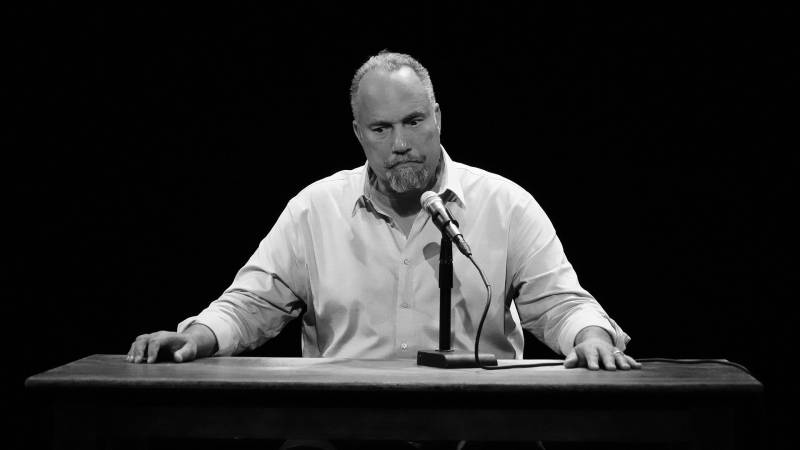Brian Watt: I read that you got the idea for this performance after visiting Anne Frank’s home in Amsterdam.
Roger Guenveur Smith: I had the opportunity to go there because I was invited to do my “Rodney King” solo in Amsterdam. It was a place that I knew that I had to go to. I stood in line with everybody else and I was extraordinarily inspired. The image that kept coming back to me was of a man who would come back to what was his home — his improvised home after the war — knowing that he had lost his wife in the death camp, but hoping that he would be reunited with his daughters. Of course, he was not, but he was reunited with the diary that he had given to Anne for her 13th birthday.
You have been involved in representing other historic figures, whether it’s collaborating with Spike Lee alongside Denzel Washington for “Malcolm X,” Huey Newton, Rodney King. So why focus on Otto Frank now?
I’m the father of two daughters, and certainly this story moved me before I went to Amsterdam. Otto Frank is a man about whom we should know much more. I think he’s kind of an enigma, even though he lived a long and productive life as a steward of his daughter’s work. So the first dilemma [he faced] is, “Do I share this? Do I destroy this? Do I get it out there internationally as my daughter would probably like me to do?” He went with his daughter’s wishes: She desired a certain notoriety.
I watched you perform “A Huey P. Newton Story” in a theater in Los Angeles. Huey Newton is a different character than Otto Frank, but I see similarities in how you built your presentations of both men. How do you get historical figures to talk about contemporary issues?
As with all of our pieces that are historically driven, we don’t want the audience to simply come to the theater and then leave the theater and say, “Wasn’t it horrible? What happened way back then?” We want our work to resonate in the present moment.
For example, I was doing [“A Huey P. Newton Story”] in New York when Biggie Smalls was murdered in Los Angeles. Everyone who came to the theater that weekend, that’s all they were thinking of. They weren’t thinking about Huey Newton. So I imagined that Huey had watched an interview of this young Biggie, Christopher Wallace, on the streets of Brooklyn.
That’s where we take people imaginatively in the theater — just as Otto Frank talks about things that happened after he was deceased, [like] the shooting at the National Holocaust Museum. That was June 10, 2009. An 88-year-old white supremacist walked into the museum with a rifle, and a young Black security guard stepped in front of him. He was shot and killed in the process of saving untold people. I should like to think that Otto Frank was privy to that.
Otto lived through the worst atrocities of World War II. How is his ghost seeing present-day Europe as Russia invades Ukraine?
He is [also] privy to what’s going on right now in Ukraine … and let’s not forget about Somalia – just as he’s privy to what happened in Charleston, Pittsburgh and Christchurch.

